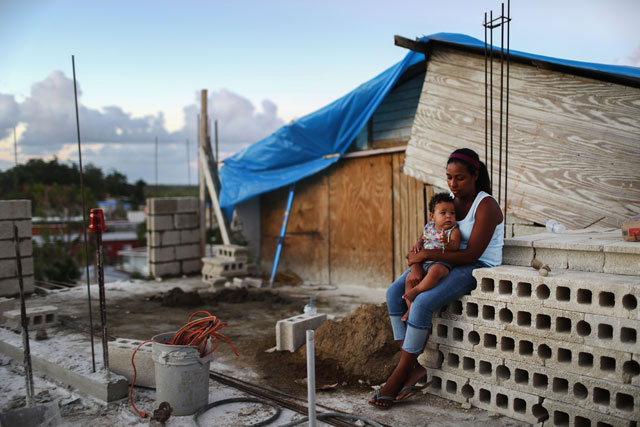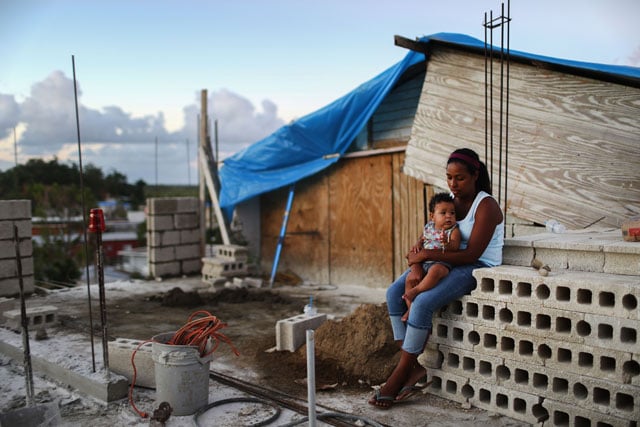
 Mother Isamar holds her baby Saniel, 9 months, at their makeshift home, under reconstruction, after being mostly destroyed by Hurricane Maria, on December 23, 2017, in San Isidro, Puerto Rico. Their neighborhood remains without electricity. (Photo: Mario Tama / Getty Images)
Mother Isamar holds her baby Saniel, 9 months, at their makeshift home, under reconstruction, after being mostly destroyed by Hurricane Maria, on December 23, 2017, in San Isidro, Puerto Rico. Their neighborhood remains without electricity. (Photo: Mario Tama / Getty Images)
For many Americans, 2017 is set to go down as the year of disaster, with three massive hurricanes and new wildfires in California together slamming areas with more than 8 percent of the United States population. With natural disasters on the rise and the resources available to respond to them fast diminishing, vigilante rescue efforts and private-driven initiatives have been stepping up to help rebalance this fatal equation and provide disaster relief.
In Louisiana, for example, a group calling themselves the Cajun Navy took their boats to Texas and started ferrying people to safety amidst the destruction wrought by Hurricane Harvey. The outfit first formed more than 10 years ago in the aftermath of Hurricane Katrina, and has provided critical first-response support every hurricane season since then, ferrying desperately needed food and equipment to-and-fro and bringing stranded people to dry land.
Their story — one of driven citizens braving the storm to help their most vulnerable neighbors — is an inspiring one. But it also speaks to the dangers of what can happen without adequately-funded public institutions and infrastructure. Heroic as they may be, citizens’ outfits like the Cajun Navy can’t be expected to compensate for severely underfunded emergency prevention and disaster response systems.
Every year in the US, floods devastate the South and fires rage in the West. But this year, natural disasters have hit an all-time high in terms of severity and fatalities. Days after Hurricane Harvey laid waste to Houston, Irma began forming in the Atlantic, coalescing into the strongest Atlantic storm in recorded history. Then came another first, as Puerto Rico’s worst natural disaster in more than 80 years, Hurricane Maria, caused catastrophic damage on the island.
These hurricanes may have passed, but the communities they destroyed are still trying to pick up the pieces. Months later, the humanitarian crisis in Puerto Rico is ongoing, with more than one-third of homes still lacking electricity. In California, the state’s worst fire season on record is raging on, with fires burning across more than 83,000 acres in the south.
Aside from causing catastrophic human and economic damage, this year’s disasters have one other thing in common: Their severity is undeniably linked to climate change.
Warming oceans provide the fuel for hurricanes through more intense evaporation. Meanwhile, higher air temperatures increase the amount of water that the air can hold. This combination increases the amount of energy and moisture available to storms, with the result that this year’s hurricanes let loose record amounts of water at an unprecedented rate. Similarly, global warming increases the likelihood and severity of wildfires, with each degree of warming turning California into an even more potent tinderbox.
Although it’s been years that scientists have been sounding the alarm about the capacity for warmer weather to trigger stronger storms, our country remains massively underprepared for this reality, with key disaster relief programs chronically underfunded.
In response to this relief deficit, numerous citizen-driven movements have sprung up across the country — not only in Louisiana and Texas, but in Puerto Rico and California too, where thousands of people have joined community relief efforts, ferrying aid directly to survivors and assisting with rebuilding.
Private actors have also stepped up to the plate. While Trump was taking to Twitter after Hurricane Maria devastated Puerto Rico, Tesla was ramping up its battery production in an effort to restore power to the hurricane-stricken island. Private planes and the fixed based operators that service them have also played a key role in running rescue operations, assisting evacuations and delivering supplies to areas in need. In Puerto Rico, for instance, one of the operators at Luis Muñoz Marín International Airport helped handle roughly 1,000 humanitarian flights at a time when public airports were stymied by the storm.
Yet these efforts, though admirable, cannot compensate for government incompetence and negligence. Even when it comes to private-driven response efforts, government support has been found wanting. For instance, with the Federal Aviation Administration set to enact new restrictions on fixed based operators that could stymie their ability to continue running, even private aviation may soon find its hands tied, unable to play a role in the inevitable next disaster.
Such failures are nothing, however, compared to the government’s inability to even ensure basic common goods, such as functioning disaster-prevention infrastructure or relief programs. After all, no GoFundMe campaign can cover the $180 billion of damages caused by Hurricane Harvey, or the $95 billion needed to reconstruct Puerto Rico. Large-scale, dependable infrastructure and disaster relief systems are needed, and these can only be government-funded. In an age when natural crises will only become more frequent, Washington needs to step it up.
Join us in defending the truth before it’s too late
The future of independent journalism is uncertain, and the consequences of losing it are too grave to ignore. To ensure Truthout remains safe, strong, and free, we need to raise $43,000 in the next 6 days. Every dollar raised goes directly toward the costs of producing news you can trust.
Please give what you can — because by supporting us with a tax-deductible donation, you’re not just preserving a source of news, you’re helping to safeguard what’s left of our democracy.